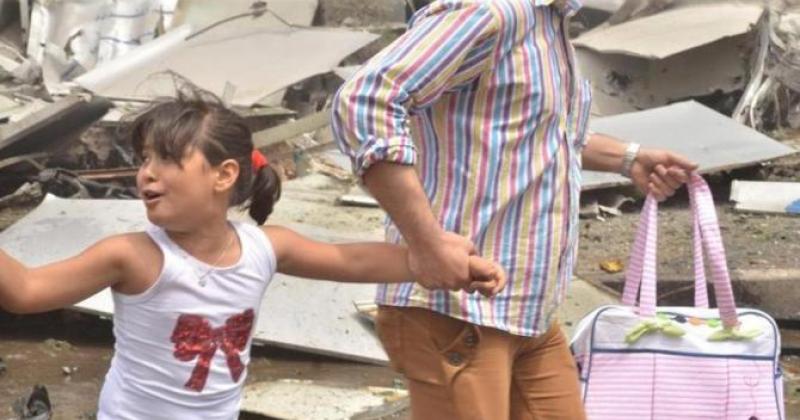An end to all hostilities in the country, the opening of humanitarian corridors for Europe and temporary visas for refugees. These are requests put forward by JRS (Jesuit Refugee Service) to curb the humanitarian crisis. The Syrian ceasefire has been reinstated in light of international negotiations. Meanwhile, the UN has condemned attacks on hospitals, calling them war crimes.
A series of appeals have been sent out, calling for an immediate ceasefire in Aleppo and other cities across Syria. One such appeal was made by the JRS (Jesuit Refugee Service) which issued a dramatic statement in recent days noting that it was forced to suspend its assistance to refugees due to an increasingly serious military escalation that has resulted in severe casualties, particularly among the civilian population. “As a precautionary measure we have immediately suspended all of our activities (distribution centre, clinic and kitchen) in Aleppo until further notice,” JRS says in its statement. “In the interest and safety of the civilian population of Aleppo we call upon all warring factions to halt all hostilities with immediate effect. We wish to express our solidarity with all those affected and pray that peace returns to Aleppo and to the whole of Syria.”
The President of Rome’s Centro Astalli (the Italian branch of the Jesuit Refugee Centre), Fr. Camillo Ripamonti, called for specific steps to be taken: “We appeal to national and supranational institutions, international organisations and diplomatic bodies active in the area to do what is necessary to establish a ceasefire in Aleppo and Syria as a whole.” “The civilian population is worn out; a path to peace needs to be opened immediately,” he added. Hence, Europe is being asked to “immediately” open “humanitarian channels to allow access for Syrian people, so that they can apply for asylum safely. Temporary visas are needed as well as measures for welcoming and protecting men and women who are innocent victims of a conflict that needs to end immediately.” The information received by JRS is hugely concerning: The city and surrounding areas are being hit by grenades, with civilians being thew worst affected since it has become impossible to provide them with assistance and support.
Last Sunday, Pope Francis spoke about the Syrian crisis during the Regina Coeli: “I have heard with great sorrow the dramatic news coming from Syria, about the spiral of violence that continues to aggravate the already desperate humanitarian situation of the country, particularly in the city of Aleppo, causing innocent victims, even among children, the ill and those who with great sacrifice are trying to help their neighbour.” The Pope sent out the following appeal: “I exhort everyone involved in the conflict to respect the ceasefire and to strengthen the ongoing dialogue, which is the only path that will lead to peace.”
UNICEF Italy’s spokesman, Andrea Iacomini, painted a disturbing picture in the account he gave to Vatican Radio: “Naturally, it is pointless to go on talking about our hopes for a peace agreement. Responses are needed right now and the most urgently required response is the creation of humanitarian corridors in the 18 cities that are under siege, in order to allow us to reach the parts of Aleppo and Syria as a whole, where these people, especially children are trapped.” UNICEF is asking for a humanitarian intervention in the areas where the crisis is most severe, starting with Aleppo. This means allowing “the Red Cross, UN humanitarian organisations, the Red Crescent and all others to enter”.
UNICEF representatives point out that all parties are violating the Convention on the Rights of the Child on a daily basis. Under this Convention, the international community is directly responsible for safeguarding these rights. Diplomats are attempting with great difficulty to restore the broken ceasefire. The UN Security Council has been working tirelessly to try to secure this minimum condition; US Secretary of State John Kerry and Russia’s Minister of Foreign Affairs, Serghei Lavrov, finally agreed on a ceasefire that is still fragile. It will come into effect on Thursday and last at least 48 hours, in Aleppo too. Jeffrey Feltman, head of Political Affairs at the UN, has stated that using starvation as a weapon against the population is a war crime. He also condemned the bombs dropped by the Syrian army on Aleppo . Meanwhile, in recent days the UN Security Council approved a resolution asking all warring parties to spare hospitals from attacks and violence in general, this includes the humanitarian personnel providing medical assistance. It has also been clearly stated that anyone who commits such acts must be investigated and prosecuted.
UN Secretary General Ban Ki-moon, has stressed that anyone who attacks a hospital is committing a war crime. In recent days, two hospitals in Aleppo were struck, both by the regime’s forces and by jihadist rebels. It is also worth recalling that besides the recent bloody incidents, the country’s health structures have suffered widespread damage as a result of a five-year-long war. This is a major cause of suffering among a population that counts tens of thousands of casualties. Another important point to make is that hospitals and medical centres have been hit in a number of conflicts around the world, from Syria to Afghanistan, to Iraq, Yemen and South Sudan.
